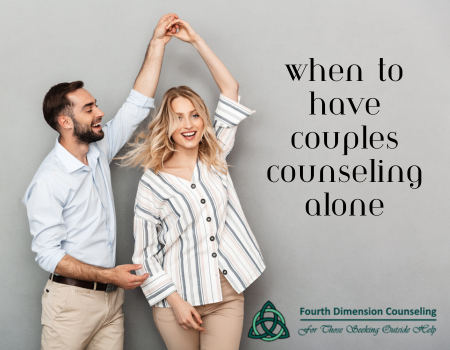In the journey of love and partnership, couples may encounter hurdles that strain their bond and create friction in their relationship. While couples counseling is often viewed as a joint endeavor, there are instances where one partner may benefit from seeking counseling alone. This decision can be a crucial step towards personal growth, self-awareness, and ultimately, strengthening the relationship. Let’s explore when it might be appropriate to consider couples counseling alone.
Consider Couples Counseling Alone If:
-
 Individual Issues Impacting the Relationship:
Individual Issues Impacting the Relationship:
Often, relationship challenges stem from individual issues that one or both partners are grappling with. These could include unresolved trauma, mental health concerns, low self-esteem, or past relationship patterns. Seeking counseling alone can provide a safe space to explore these personal issues, gain insight into their impact on the relationship, and develop healthier coping mechanisms.
-
Communication Breakdowns:
Effective communication is an integral part of a healthy relationship. However, when communication breakdowns occur, it can lead to misunderstandings, conflicts, and resentment. Seeking counseling alone can help individuals identify communication barriers, learn assertive communication skills, and work on expressing their needs and emotions more effectively within the relationship.
-
Coping with Stress or Life Transitions:
Life transitions, such as job changes, relocation, parenthood, or loss, can place significant strain on a relationship. During these times, one partner may find themselves struggling to cope with stress, anxiety, or grief, which can impact their ability to engage fully in the relationship. Individual counseling can provide support, guidance, and coping strategies to navigate these challenges and strengthen resilience.
-
Healing from Infidelity or Betrayal:
Infidelity or betrayal can profoundly shake the foundation of a relationship, leaving both partners grappling with feelings of hurt, anger, and mistrust. While couples counseling is often recommended to address the aftermath of infidelity, individual counseling can also be beneficial for processing emotions, rebuilding self-esteem, and exploring forgiveness and healing independently.
-
Addressing Personal Growth and Development:
Personal growth and self-awareness are essential components of a thriving relationship. Seeking counseling alone allows individuals to explore their values, goals, and aspirations outside of the relationship context. It can provide an opportunity for self-reflection, identity exploration, and personal development, ultimately enriching the individual and enhancing the relationship dynamic.
-
Overcoming Codependency or Enmeshment:
In some cases, individuals may find themselves in codependent or enmeshed relationships, where boundaries become blurred, and personal autonomy is compromised. Individual counseling can help individuals establish healthy boundaries, develop a sense of self-identity, and break free from patterns of codependency, fostering greater independence and resilience within the relationship.
-
Preparing for Couples Counseling:
In situations where one partner is hesitant or resistant to attending couples counseling, seeking individual counseling can serve as a stepping stone towards eventual joint therapy. It allows the reluctant partner to address their concerns, build trust with the therapist, and gain a better understanding of the benefits of couples counseling.
-
Dealing with Chronic Relationship Patterns:
In some relationships, recurring patterns of behavior or conflicts may persist despite efforts to resolve them together. These patterns can stem from underlying dynamics, such as power struggles, emotional triggers, or unresolved issues from the past. Seeking individual counseling allows partners to delve into these patterns from a personal perspective, gaining insight into their own role and contributions. By addressing these patterns individually, partners can break free from destructive cycles and cultivate healthier dynamics within the relationship.
-
Managing Differences in Needs and Values:
Every individual brings their unique set of needs, values, and preferences into a relationship. However, differences in these areas can sometimes lead to tension or conflict. Individual counseling provides a space for partners to explore their own needs, values, and priorities, gaining clarity on what is truly important to them. By understanding and honoring their own needs, individuals can navigate differences more effectively and negotiate compromises that support both partners’ well-being.
-
Rediscovering Personal Identity:
In long-term relationships, it’s common for individuals to prioritize the needs of the partnership over their own personal interests and aspirations. While collaboration and compromise are integral to a healthy relationship, it’s also essential for each partner to maintain a sense of individual identity and fulfillment. Individual counseling can help individuals reconnect with their passions, hobbies, and personal goals, fostering a stronger sense of self within the context of the relationship.
-
Processing Emotional Trauma:
Emotional trauma from past experiences, such as childhood abuse, neglect, or significant losses, can have a profound impact on an individual’s emotional well-being and their ability to form healthy relationships. Seeking counseling alone provides a supportive environment to process and heal from these traumas, reducing their influence on current relationship dynamics. By addressing unresolved trauma, individuals can cultivate greater emotional resilience and intimacy within their relationships.
-
Strengthening Self-Esteem and Confidence:
Healthy self-esteem forms the foundation for assertive communication, boundary-setting, and mutual respect within a relationship. However, low self-esteem can manifest as self-doubt, insecurity, and dependency, which can strain relationship dynamics. Individual counseling offers strategies to boost self-esteem, challenge negative self-talk, and develop a more positive self-image. By cultivating self-confidence and self-worth, individuals can engage more authentically and confidently in their relationships.
Choosing to pursue couples counseling alone can be a proactive and empowering step towards personal growth and relationship improvement. By addressing individual concerns, exploring personal development goals, and fostering self-awareness, individuals can lay the groundwork for healthier, more fulfilling relationships. Whether addressing specific challenges or seeking to enhance overall relationship dynamics, individual counseling offers a valuable opportunity for self-discovery, healing, and transformation.
